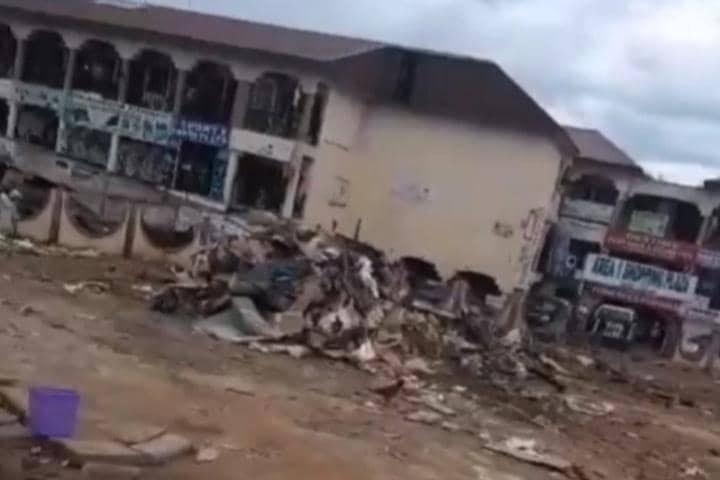Demolished parts of Area 1 Market, Abuja, Nigeria.
Area 1 Market has long been the bustling center for general traders and small to medium scale businesses. Some of these businesses have seen a transformation unfold (the demolition of parts of Area 1 market) in recent weeks that has changed their daily lives. Let us look at how the effects of this demolition has changed the face of the parts popularly known for sales of Kilishi.
We believe that the need for stability in our modern urban markets and the quest for improved infrastructure drove the decision to demolish sections of Area 1 Market. This decision, while necessary for the city’s growth, has cast a long shadow over the livelihoods of those who depended on the market to make their daily income.
For decades, Area 1 Market has been home to a wide variety of general traders, offering everything from clothing to electronics, food to household goods, fashion items and appliances. But with the demolition, some traders found themselves in a sea of uncertainty. The loss of their shops and stalls translated into a loss of income and stability.
According to Punch News sources, the Department of Development Control, spoke with the traders and managers of the market to reach an understanding. They were informed that the congested nature of the market, and its unhygienic and untidy conditions were also put into consideration and is one of the reason parts of the market is being demolished.
Sani Mohammed, a kilishi seller in Area 1 Market said “They told us they want to put up canopy and make our stalls better. We just stay by the road now to sell because some of our customers keep calling us that they want to buy Kilishi and we sell to them”
Area 1 Market wasn’t just a trading hub; it was a vital link connecting small-scale traders with urban consumers. The popular product sold in the demolished part “Kilishi”, while available in most locations, Area 1 market was the one-stop-shop for this product. Dealers from nearby rural areas relied on the market to sell their fresh produce. The demolition, however, disrupted this lifeline.
“The market leaders told us not to worry, that they will make our stalls better and we are still waiting”.
-Sani Mohammed
With traders displaced and the market’s capacity reduced as many took to selling by the roadside, this transition has presented its fair share of hurdles but it also opened up new avenues for market access and redefined the relationship between urban and rural communities.
Next Steps for Affected Businesses
The demolition is a sobering reminder of how integral market linkages are to our community’s daily life. This would be a good opportunity for enterprising traders to seize the moment and venture into new locations or embrace online selling. This transition came with its own set of challenges but also offered a glimpse of hope.
The noticeable decline in both the number of traders and customers frequenting the area will make the journey towards recovery seem like a rocky road, with many struggling to find their footing. As with all good things, this development of modern infrastructure and commercial spaces can serve as a beacon for investors eager to reshape the area.
Many of these traders can embrace technology and its techniques to maximize their resources and collectively access new markets with greater efficiency. Change, as we’ve seen, is a multifaceted phenomenon. The demolition in Area 1 Market, Abuja, disrupted the lives and businesses of general traders and small-scale farmers, but it also paved the way for new opportunities and investments. In this evolving landscape, resilience, adaptability, and creativity have become the watchwords.
As Abuja continues to evolve, it is crucial for stakeholders to collaborate, adapt, and harness the potential of this transformation for the betterment of the community. Area 1 Market bears the marks of its evolution, and it falls upon its people to ensure that it remains a vibrant hub of commerce and community in the heart of the city. The story of Area 1 Market is not one of destruction but of transformation and renewal, offering valuable lessons for businesses and communities alike.

